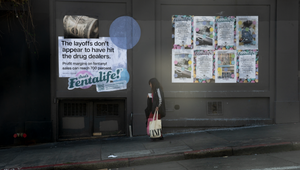
5 Minutes with… Stephen Goldblatt

Stephen Goldblatt is most comfortable in the spaces between. When he spoke to LBB early last year, we learned about the creative sweet spot amidst individualism and collectivism, and how his approach to work was informed by a relentlessly active pursuit of inspiration.
If that suggests a hyperactive mind and imagination, then it paints an accurate picture of the Partners in Crime founder and former agency creative with the likes of Goodby, Silverstein & Partners, Evolution Bureau, West, and MullenLowe amongst others. Today, Stephen is passionate about elevating the voices of individuals within creative teams - nurturing and protecting them from the countless external forces which threaten to undermine or override them. In so doing, he’s practising his own unique interpretation of creative freedom: One in which it comes paired with great responsibility.
Catching up with Stephen, LBB wanted to cover as much ground as possible. Whilst there’s never quite enough time to chew through everything (this is ‘5 Minutes with…’, after all), we managed to cover childhood obsessions, iconic work, time machines, and how the industry could take better care of its people…
LBB> Stephen, let’s start at the beginning. What kind of a kid were you growing up - and at what point do you first remember thinking of yourself as a ‘creative’ person?
Stephen> The first thing that jumps to my mind is an obsession with baseball cards. I’ve always been a collector - or a ‘hoarder of kind of interesting things’, as I prefer to call it. When I was collecting baseball cards, I would study the graphic design on the fronts, the photographic styles, and the typography that was used each year. I was like a little kid (literally) every time it changed for the new season. And looking at the statistics displayed on the back was a crash course in information design - giving you a ton of detail in the most visually efficient way possible. I understood all of that as much, if not probably more, than how the players were actually performing on the field.
So the design of baseball cards was having a much greater influence on me than the sport itself. I remember that triggering something in my brain - helping me to understand myself and what I was passionate about.
LBB> So how does that youthful, obsessive passion compare with what you feel when you dive into a fresh creative brief today?
Stephen> I like to think it’s comparable. You want your work to stand the test of time, or to be ‘iconic’ in whatever way you choose to define that.
LBB> Do you think it’s difficult to create ‘iconic’ work in the context of the modern industry?
Stephen> Sure, but it’s never been easy. I learned early on in my career that, if you wanted to get anywhere, you had to get used to the idea that there are always going to be a lot of hands in your work and a lot of eyeballs over your shoulder. Technology, budgets, and timelines can all either make or break the work.
So I believe the impetus is on the writer, designer, or the art director, to be their own filter and to have been inspired by the good stuff. When I think about the designers I work with, I like people who come to the table with really buttoned-up stuff that’s thoughtful, tasteful, and has a point of view. That’s how you give an anchor to your work which helps it to weather the inevitable storms.
If you’re approaching the industry with the approach of ‘this will do’ or ‘that works I guess’, then AI should take your job, frankly.
LBB> So does it help for creative people to be stubborn, in your opinion?
Stephen> No, it’s not stubbornness, it’s more about holding yourself to a high standard. To be clear, I’m not trying to lionise or deify the idea of a single-minded, lone-wolf creative. Far from it - you need to be collaborative, open-minded, and positive. My point is that having those high standards can ground you and ensure you maintain good taste. The best creatives are both inspiring and inspired.
LBB> Do you think those types of creatives are thriving in 2024?
Stephen> In terms of the work, absolutely. And fortunately, I get to work with a lot of them! Plenty of amazing work is being made as we speak right now.
Where I do think the industry has a problem is that a stagnating ‘traditional’ model seems to be having a negative impact on creatives’ work stability. There’s a sense of fear around getting laid off. I get a feeling that agencies struggle with staffing, and how to scale talent. The work isn’t suffering, but I fear the people might be.
LBB> Creatives suffering for their art is a tale as old as time. Is that simply the way it needs to be?
Stephen> Not at all. Why should it be? My experience is that people thrive when they’re asked to do what they do best.
In the traditional agency structure, I do think it’s too easy to become preoccupied with pleasing people over maintaining those standards and tastes we were just talking about. This is something the industry needs to figure out. The reaction to last week’s news about Wieden+Kennedy laying off 20% of their Portland staff underlines this. Office size, FTEs, and overhead used to be the mark of 'success' or 'growth.' Now, they're liabilities. At Partners in Crime, our thinking is that a more flexible and scalable model of experts has to be the future.
LBB> For creatives in that position, is becoming a freelancer the answer?
Stephen> Well, freelance is a slippery and transactional place for a lot of people. Plus, it’s a loaded term. When I hire people, I don’t tend to use the word ‘freelancer’ because it’s been cheapened. In some places, being a freelancer is like being a second class citizen. Not at Partners in Crime, of course - with us, it’s a seat at the table.
Being independent is empowering for others. When you think about individuals as experts in their craft, that their skills have been honed by their own experiences and they’ve developed a voice and tastes entirely of their own, that’s a wonderful thing.
LBB> So how do you ensure, as a leader, that you’re bringing out that sense of creative individualism in the people you work with?
Stephen> The environment requires five qualities. Resourcefulness, humility, selflessness, emotional intelligence, and adaptability. If you can instil that kind of environment, then you have the best chance of creating something that’s all about the idea. We want to encourage individualism, but not ego. Your voice and your tastes need to serve the collective goal. And once we have created something we’re proud of, we share credit and responsibility collectively.
Great work happens when you can find the balance between the individual and the collective. I think a great example of that working in practice is “That’s Fentalife”, our work with TogetherSF Action from last year.
Amidst the public health crisis in San Francisco, characterised by failed drug policies, our Fentalife campaign served as a provocative street-level wake-up call aimed directly at San Francisco's City Hall. The team I brought in consisted of Alex Flint, and designer Chris Logan. Alex’s wife, Lynn is a doctor, so he was having conversations daily not just about the drug itself but also the impact on the wider city and the bureaucracy surrounding criminalising it.. During our concepting sessions, we came up with about 25 ideas and at some point during the conversation one of us blurted out that they all fell under the umbrella of ‘That’s Fentalife!’, the normalisation of a crisis that the citizens of SF are dealing with. The unfortunate new normal. And that became the idea.
Chris was essential in finding the personality which fed into the style and tone of the final campaign. He understood the humour in the bleak irony of it all. I believe that only this group could have made this work - and that’s one reason why it was so effective.
LBB> Before we finish, I’d love to ask about how you develop your own individual creative voice. As any of your Instagram followers can attest, you have a passion for collecting photobooks - is that something that gives you inspiration?
Stephen> Being surrounded by inspiring visuals and inspiring stories - things that people have laboured over - is always going to invigorate me. How could it not?
The Decisive Moment by Henri Cartier-Bresson is something I think about often - this idea that photography captures fleeting moments where things align naturally in the frame. It’s the same reason we love the feeling of serendipity, where things fall naturally and satisfyingly into place.
LBB> Finally, imagine you had access to a time machine. What career advice would you give to your past self, and why?
Stephen> I could give advice, but would the younger me want to hear it? It’s hard to hear advice when you’re in the moment. If you’re experiencing disappointment, it doesn’t make it any easier to have some wise old head say “embrace failure as a part of growth”. It just has to happen naturally, with all the pain and bumps along the way that comes with it.
So just continue on your path. It’ll figure itself out.












.jpg)
